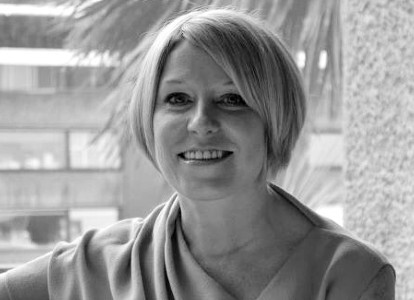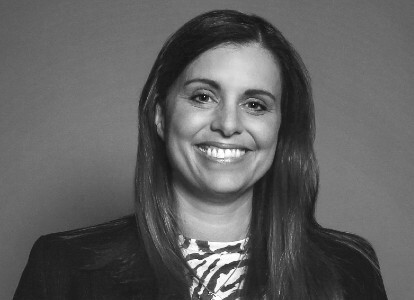
Following a successful tenure as Director of Communications at the Rail Delivery Group, Marianna Panizza shares with us her journey spanning two decades in strategic communications. Starting her career with a crisis specialist consultancy, Marianna moved in-house as Deputy Head of Media at Heathrow where she helped to drive forward a groundbreaking advocacy campaign, securing parliamentary approval for expansion. Transitioning ‘from planes to trains’ at the Rail Delivery Group, she steered the rail industry’s reputation.
In our interview, Marianna emphasises the philosophy that underpins her success – the importance of fostering shared ownership and purpose within teams, talks about her commitment to continuous learning and, outside of work, we discover what she pins to her Pinterest boards!
1. You have successfully navigated your career, most recently working as a Director of Communications – achieved within 20 years. Tell us how you got here.
I started at a boutique crisis management consultancy, so from the outset my career was grounded in the understanding that your reputation is central to your social license to operate, and that it is defined not just by what you say, but by the real-world impacts of business decisions. I loved the work, but I eventually wanted to be more rounded professionally. A move to Blue Rubicon, splitting my time between their in-house crisis team and proactive corporate and consumer briefs, gave me that opportunity.
There followed an invaluable 5 years honing my skills, learning from some very smart people, and delivering interesting and inspiring work for clients, following which I made the move in-house to Heathrow. Their objective was to U-Turn Prime Minister David Cameron’s pledge to block a third runway, and spotting the potential to play a key role in a potentially totemic advocacy campaign being built from the ground up, I wanted in. My time there was a career-defining masterclass in setting the terms of the debate, mobilising stakeholders and bringing together all parts of a comms function to deliver a business-critical outcome. Ultimately, we succeeded in securing an overwhelming parliamentary vote in favour of expansion, and both the internal organisation and the external execution of that campaign continue to guide my ethos to running teams today.
After the vote I was ready for a fresh challenge, and my former boss, who had moved to rail, recommended me for a role at Rail Delivery Group (RDG) to establish a new industry-wide reputation campaign. Within six months of the launch, support for the industry had up ticked by 10% and, having never thought of myself as a ‘rail person’, I found working for a sector that really matters to the economy, was never far from the headlines and that people care passionately about was compelling. The following years were challenging but never dull, going from blanket front pages when we called for reform of the fares system, to landing most of our key asks in a generational government review into the structure of the industry, and guiding and overseeing rail’s unified response to Covid. I’ve since left that role but have been retained as a senior strategic advisor to RDG and within consultancy.
2. At RDG you managed the rail industry’s reputation in coordination with 27 train companies; an enormous task. How did you work with those companies to effectively manage this responsibility?
Train company comms teams are extremely knowledgeable about their businesses, their stakeholder environment, and their media landscape – it’s vital to respect and regularly draw on that expertise. There are however times when it’s of mutual benefit to pull together to manage an issue or tell a consistent story about where the wider industry is going. In those instances, it pays to make it as easy as possible for others to support and adapt the central message, and to demonstrate how it will add value to the work they’re already doing – in other words, to plane with the grain of the wood. Asking people to implement something which stretches their busy teams or jars with their own comms strategy is unlikely to fly, so you need to be realistic about that and adapt accordingly.
3. Your crisis communications credentials are exemplary – working at Heathrow must have been eye opening. When a crisis hits, what have you learned?
There are some basic principles: good crisis planning starts with preparation – horizon scanning, anticipating and proactively managing down issues before they escalate and having well-rehearsed procedures. When the worst does happen, your job as a leader is to stay above the fray, set the tone for the team and make space to scenario plan to get ahead of it. At the coalface, you should make sure that your organisation is the single, most authoritative source of information and that you are regular and timely in providing updates – without which the vacuum will inevitably be filled with speculation. Finally, where relevant in communications I always stick to the principle of the three c’s I was taught by my first boss Mike Regester – demonstrating concern for those affected, control of the situation and a commitment to make sure there won’t be a repeat.
4. What is your advice for building rapport and influencing stakeholders, especially in the face of governmental and public scrutiny?
It starts with an outside-in perspective, understanding their priorities and framing what you’re doing to be helpful to them meeting them. Where there are differences, acknowledge them and try to find solutions together, so you’re on the same side of the table rather than in a combative stance. Your engagement should feel meaningful – there’s little worse than seeking people’s views, concerns or feedback and then failing to demonstrate that you’ve listened.
Sometimes, especially in a trade body/quasi arms-length body or if your organisation has contractual links with government, you may decide to move forward with a public intervention that risks some political blowback - and judgements about how and when to do that are finely balanced. In those instances, make sure you’re internally aligned and prepared at all levels – up to including Board if necessary - and never to let business critical stakeholders be taken by surprise. Even if your decision isn’t popular with the powers that be, if you’ve been transparent about your intentions, you will be able to defend it.
5. You have led large teams. What would you say is the most important lesson you have learned when managing people?
Teams thrive when they have a sense of shared ownership and a real clarity of purpose to rally around. Everybody wants to feel valued and like they’re making a genuine difference, so its important to give trust and autonomy combined with support, and always come back to your communications objectives and strategy. It’s also important for morale to encourage colleagues from within the business to call out communications successes directly to your team.
6. Please share with us the most memorable challenge you have faced in your career so far and how did you overcome it?
Covid was unique in its scale and complexity. At the outset we had to coordinate and coalesce the industry and its main stakeholders around the management of three announcements in quick succession: Reducing the timetable by 90%; the collapse in revenue which prompted the end of the franchising model; and the introduction of masks on all services and how to encourage passengers to use them. Part of this meant brokering some very live discussions between industry and government around the practicalities of maintaining social distancing on a mass transit system. We also had to work with government to find the right balance between reassuring passengers the industry was taking their safety seriously, and not overstating the risk of transmission on trains.
I’m proud that the industry and team rose to the challenge, pulled together in the common interest, and showed itself at its best. Our strategy was to showcase the resilience of the railway and the centrality of passenger safety in all decision making. Those principles came through in both the tone and timing of how our advice to passengers evolved throughout the pandemic, and in RDG’s ‘travel with confidence’ campaign, adopted by all parts of the network with common branding and an emphasis on mutual measures train companies and passengers were taking to help control the virus. The team got creative with it too – from John Motson in a sheepskin facemask giving advice to football fans on their way to matches, to key workers taking over station tannoys giving passenger safety advice.
It’s through a combination of those efforts nationally and locally and the gargantuan work that took place operationally, that rail emerged from the early days of the pandemic with its trust metrics enhanced - surpassing the airline industry, the post office and the NHS for the first time.
7. What would you say are your three key attributes that have contributed to your career success?
An ability to join the dots and see the bigger picture across the external and political landscape and within the business itself; sound judgement, which has helped me become a valued advisor, and creative tenacity – if I spot an opportunity, it pains me not to see it capitalised on.
8. Who or what inspires you, and why?
There is always something more to learn and someone great to learn from, so I’m always hungry to find out more about communications theory and practice. A good example is Harvard cognitive linguist George Lakoff, who wrote Don’t think of The Elephant and is the godfather of communications framing – I was introduced to him by a colleague, and he’s informed so much of my approach to comms. Other great books are the Art of Persuasion by Bob Burg, and How to Win Campaigns by Chris Rose.
9. If you hadn’t ended up working in comms, what was your plan B?
When I graduated, I ran the gauntlet in my mind from advertising, to journalism, to TV production, which are all pretty comms based. Now I’m older, I realise how much I enjoy political analysis and travel so perhaps something in diplomacy, with an assumption that I’d be posted somewhere with a great climate!
10. How do you maintain a healthy work-life balance, especially when working in high-pressure environments?
My husband works in music and his job couldn’t be less like mine, which provides a natural break whilst offering some occasionally much needed perspective! We do however share a common interest in doing up our home, so if I’m not working, you’ll mostly find me immersed in Pinterest saves and fabric samples.
Thank you, Marianna.
For a free download of our full Annual Salary Guide 2023, click here. Salary Guide 2024... coming SOON.
Time for a change? Check out our latest jobs!
The Works Search: a search consultancy specialising in PR and corporate communications. We have unrivalled matching abilities and are known for finding the top 5% performers in the industry - the ones who deliver and make your reputation great. For more advice or market insights, do get in touch with us on 0207 903 9291 or email: sarah@the-works.co.uk.


